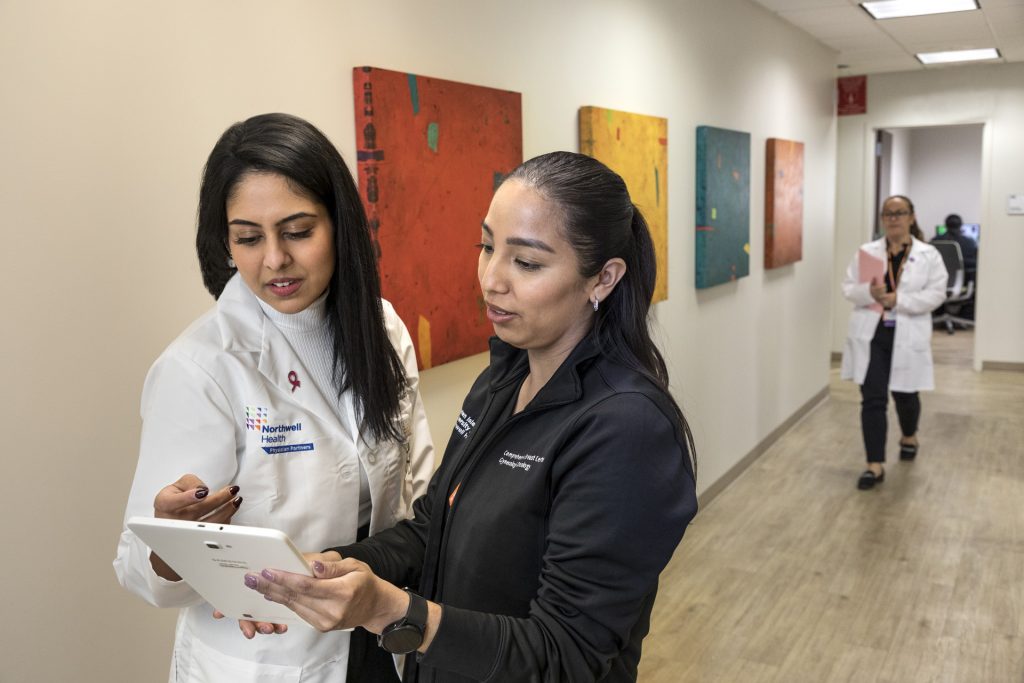THIS ACCOMPLISHED SURGICAL ONCOLOGIST WITH STATEN ISLAND UNIVERSITY HOSPITAL’S FLORINA CANCER CENTER DISCUSSES HOW STATE OF THE ART TECHNOLOGY, INDIVIDUALIZED CARE, AND EMPATHY ARE ALL CHANGING THE FACE OF BREAST CANCER TREATMENT ON THE ISLAND
BY AMANDA McCOY PHOTOS BY AMESSE PHOTOGRAPHY
According to the Breast Cancer Research Foundation, every 14 seconds a person is diagnosed with breast cancer worldwide. In the United States alone, an estimated 240,000 women (and 2,100 men) are diagnosed each year, and one in eight women are expected to develop invasive breast cancer throughout the course of her life. The good news? Though breast cancer is the second most common form of cancer in American women (falling behind only skin cancers), it is becoming increasingly treatable; groundbreaking advancements in diagnostics, genetic testing, minimally invasive surgery, and specialized care are together making major strides in breast cancer care.
“It’s an emotional and difficult time in any patient’s life, but the encouraging news is that so many types of breast cancers are treatable and have high success rates,” noted Karishma Kollipara, DO, a surgical oncologist who specializes in breast cancer at Staten Island University Hospital’s Florina Cancer Center. “The key is to catch the tumor early.”
Upon completing her residency at St. Barnabas Hospital in the Bronx followed by a fellowship with Mount Sinai West, Dr. Kollipara joined SIUH in November 2022. “SIUH is highly focused on patient-centric care, and that spoke to me,” said Dr. Kollipara, who grew up in India and Chicago but had already established a connection to the borough as her husband is a native Islander. “The patient is at the center of the care, and all treatment plans are decided in a multidisciplinary fashion. The staff here, from the assistants to the nurses to the surgeons, are all highly empathic and dedicated to helping patients through this difficult process.”
In her practice, Dr. Kollipara treats a full range of benign and malignant breast tumors in both women and men of all ages. (A common misconception, she pointed out, is that breast cancer only plagues women over 40, but young women and men are also diagnosed with invasive breast disease every year.) At Florina Cancer Center, each patient who receives a positive diagnosis is assigned a nurse navigator, a dedicated practitioner who stays connected to the patient throughout every step of their treatment journey.

“Once we receive the pathology report, the nurse navigator reaches out to the patient to talk through the process and answer any questions they may have,” said Dr. Kollipara, adding that the nurse joins the patient in their first appointment and continues to talk to them every day. “They’ll even call and speak with family members who couldn’t be present or have follow-up questions, ensuring seamless care that allows the patient to feel prepared and supported throughout the entire process.”
What’s more, there are several factors contributing to the advancements in breast cancer care, according to Dr. Kollipara. Improvements in imaging technology are assisting physicians in identifying tumors even earlier, which significantly boosts success rates for eradicating any type of cancer. “We’re incorporating input from artificial intelligence,” the physician explained. “AI can flag certain areas, then the radiologist goes back and looks through the images to comb for any abnormalities a tremendously helpful way to catch cancers early.”
Mastectomies used to be the gold standard in breast cancer treatment, but in recent years surgeons are performing more lumpectomies, a less invasive surgery that removes a specific portion (or “lump”) of breast tissue. “We remove the cancer and a small amount of surrounding tissue, far less tissue than we were required to remove in the past,” said Dr. Kollipara. “Most patients won’t even notice there is tissue missing.”

Breast cancer care is also becoming more individualized, noted Dr. Kollipara. “At Florina Cancer Center, we focus on which treatment options would best serve each patient and his or her tumor,” she said. “It’s not a blanket, ‘Everyone gets chemotherapy or radiation’ course; we are tailoring plans to the patient’s specific cancer.”
Taking a multidisciplinary approach to treatment planning is also critical in determining the best course of action for each individual patient, explained the doctor. The breast cancer surgical oncology teams across the entire Northwell network meet frequently to discuss next steps in oncologic cases. “It ensures we are all in agreement in which is the best treatment course for each patient.”

Communication is key on the patient side as well, noted Dr. Kollipara, who offers her personal cell phone number to her surgical patients and their families, even if those family members live on the other side of the world. “We had a patient whose son lives in Russia, and we remained in constant contact with him throughout every step of the process,” she said. “I think being there for the patient in all facets, not just narrowing in on the patient’s diagnosis, is the differentiating factor between a capable physician and a great one.”
Staten Island University Hospital, Florina Cancer Center
475 Seaview Avenue
northwell.edu/sicancercenter
